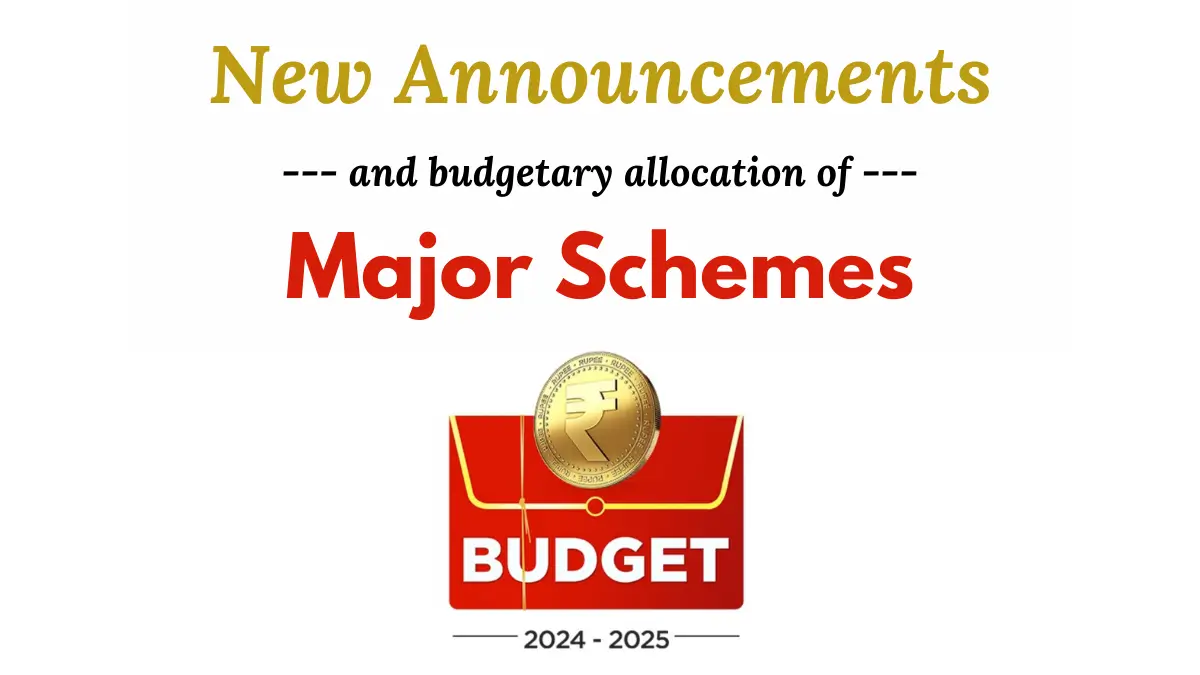The Union Budget for 2024-25, presented by Finance Minister Nirmala Sitharaman on 23rd July 2024, introduced several new social welfare schemes and reinforced existing ones. The focus was on employment, skilling, MSMEs, agriculture, urban development, and social justice, aiming to ensure inclusive growth.
Here’s a detailed breakdown of the major schemes announced in 2024-25 union budget and their key aspects.
1. Employment & Skilling Initiatives
The budget introduced a comprehensive package to facilitate employment and skilling opportunities for 4.1 crore youth over a five-year period with a central outlay of ₹2 lakh crore.
Key Schemes:
- Employment Linked Incentive Scheme (ELI):
- Scheme A: First Timers – Provides one-month wage subsidy up to ₹15,000 for newly entering employees.
- Scheme B: Job Creation in Manufacturing – Incentives for employers hiring first-time employees in the manufacturing sector.
- Scheme C: Support to Employers – Reimbursement of EPFO contribution for employers creating new jobs.
Budgetary Allocation: ₹1.48 lakh crore for education, employment, and skilling.
- Internship Scheme for 1 Crore Youth:
- Targeted Beneficiaries: 1 crore (10 million) youth
- Companies: 500 top companies
- Duration: 12 months
- Monthly Stipend: INR 5,000
- One-time Assistance Amount: INR 6,000
- Company Contribution: 10% of training and internship costs from CSR (Corporate Social Responsibility) funds
- Sector: Manufacturing
2. Agriculture & Allied Sectors
The budget focused on increasing productivity, resilience, and self-sufficiency in agriculture, promoting natural farming, and enhancing support for shrimp production and export.
Key Schemes:
- Natural Farming: 1 crore farmers to be initiated into natural farming within two years.
- Pulses and Oil-seeds Mission: Strategy for self-sufficiency in pulses and oilseeds.
- Digital Public Infrastructure for Agriculture: Digital crop survey for Kharif using DPI in 400 districts.
Budgetary Allocation: ₹1.52 lakh crore for agriculture and allied sectors.
3. Urban Development
The budget emphasized transforming cities into growth hubs with better infrastructure, housing, and services.
Key Schemes:
- PM Awas Yojana Urban 2.0: Addressing housing needs of 1 crore urban poor and middle-class families.
- Water Supply and Sanitation: Promoting water supply, sewage treatment, and solid waste management projects in 100 large cities.
Budgetary Allocation: ₹2.66 lakh crore for rural development, including rural infrastructure.
A comprehensive approach to ensure all-around development and social justice was adopted, focusing on women, youth, farmers, and the poor.
Key Schemes:
- PM Awas Yojana: 3 crore additional houses in rural and urban areas.
- Purvodaya: Development of Eastern states covering Bihar, Jharkhand, West Bengal, Odisha, and Andhra Pradesh.
Budgetary Allocation: ₹3 lakh crore for schemes benefiting women and girls.
5. Support for MSMEs
Several measures were introduced to support MSMEs, particularly in manufacturing and services sectors.
Key Schemes:
- Credit Guarantee Scheme: Facilitating term loans without collateral for MSMEs.
- Mudra Loans: Enhanced limit from ₹10 lakh to ₹20 lakh for successful entrepreneurs.
Budgetary Allocation: Significant investments and support through various schemes and policies.
6. Energy Security
The budget highlighted the importance of energy transition, promoting renewable energy, and enhancing energy security.
Key Schemes:
- PM Surya Ghar Muft Bijli Yojana: Rooftop solar plants for free electricity up to 300 units monthly.
- Research and Development in Nuclear Energy: Partnering with the private sector for setting up small and modular nuclear reactors.
Budgetary Allocation: Investments and policies supporting energy transition and sustainability.
7. Infrastructure Development
Major investments were announced for infrastructure development to boost economic growth and create jobs.
Key Schemes:
- Pradhan Mantri Gram Sadak Yojana (PMGSY) Phase IV: Providing all-weather connectivity to 25,000 rural habitations.
- Tourism Development: Comprehensive development of tourist sites like Vishnupad Temple Corridor and Mahabodhi Temple Corridor.
Budgetary Allocation: ₹1.11 lakh crore for capital expenditure on infrastructure.
Detailed Breakdown of Specific Schemes
Employment Linked Incentive Scheme (ELI)
- Scheme A: First Timers
- Duration: 2 years
- Beneficiaries: 1 crore persons annually
- Subsidy: One-month wage up to ₹15,000
- Scheme B: Job Creation in Manufacturing
- Duration: 4 years
- Eligibility: Corporate entities and non-corporate entities with a 3-year EPFO contribution record
- Incentive: Shared equally between employer and employee based on EPFO contribution
- Scheme C: Support to Employers
- Duration: 2 years
- Incentive: Reimbursement of EPFO employer contribution up to ₹3,000/month
Agriculture Initiatives
- Natural Farming: Target of 1 crore farmers within 2 years, supported by certification and branding.
- Pulses and Oilseeds Mission: Strengthening production, storage, and marketing for self-sufficiency.
- Digital Public Infrastructure: Digital crop survey for Kharif in 400 districts, covering 6 crore farmers and their lands.
Urban Development
- PM Awas Yojana Urban 2.0: Investment of ₹10 lakh crore, central assistance of ₹2.2 lakh crore over 5 years.
- Water Supply and Sanitation: Bankable projects for 100 large cities, promoting irrigation and water management.
Social Justice Initiatives
- PM Awas Yojana: 3 crore additional houses for rural and urban areas.
- Purvodaya: Development initiatives for Eastern states, including industrial and infrastructure projects.
Support for MSMEs
- Credit Guarantee Scheme: Up to ₹100 crore guarantee cover for machinery and equipment loans.
- Mudra Loans: Enhanced limit to ₹20 lakh for successful entrepreneurs under the ‘Tarun’ category.
Energy Security
- PM Surya Ghar Muft Bijli Yojana: Rooftop solar plants for 1 crore households, providing free electricity.
- Nuclear Energy R&D: Development of small and modular reactors in partnership with the private sector.
Infrastructure Development
- Pradhan Mantri Gram Sadak Yojana Phase IV: All-weather connectivity for 25,000 rural habitations.
- Tourism Development: Transforming Vishnupad and Mahabodhi Temple Corridors into world-class destinations.
The Union Budget 2024-25 aims to drive inclusive growth through significant investments in employment, skilling, agriculture, urban development, social justice, MSMEs, energy security, and infrastructure. The focus on comprehensive schemes across various sectors reflects the government’s commitment to building a ‘Viksit Bharat’.
For detailed figures and more information on each scheme, please refer to the annexures and specific sections of the budget document.

